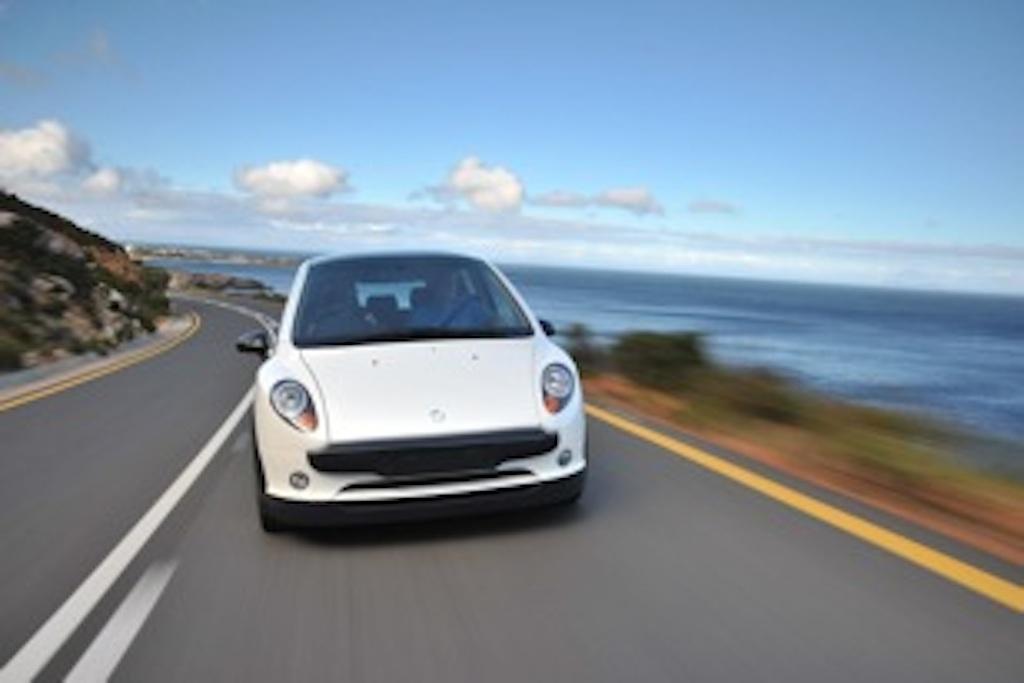South Africa’s electric ride (PHOTOS)
The much-hyped electric car Joule, by South Africa’s Optimal Energy, will make what it hopes will be a fashionably late entrance in 2015 with 50,000 autos per year.
CAPE TOWN, South Africa — South Africa has entered the electric-car sweepstakes.
Joining the lineup of electric vehicles, including the Chevy Volt, G-Wiz, Nissan Leaf and plug-in Prius, is a car developed in Cape Town.
The innovative Joule, by South Africa’s Optimal Energy, plans to make a fashionably late entrance in 2015 with 50,000 autos per year.
“Our vision is to establish and lead the EV [electric-vehicle] industry in South Africa,” said Diana Blake, marketing director for the Joule.
In Cape Town, where Optimal Energy’s offices are based, Joule prototypes on the road get knowing looks and comments. The Joule has been hyped here for years, with the projected release date inching ever-forward.
More from GlobalPost: Chile to host solar car race
Funding has been the main problem to getting Joules made on a large scale. South Africa has long manufactured cars for Mercedes-Benz and other companies, but never designed and produced one of its own. The government has invested in the Joule and has pledged much more, but as Blake put it, “We still don’t have that money in the bank.”
If the financing comes through as currently planned, the first 5,000 units will be available locally at R270,000 ($34,000), with subsequent rollouts planned in Western Europe and North America.
CEO Kobus Meiring has an eclectic resume, including development of a helicopter and the SALT telescope. A bit of fortuitous luck in the early stages of conceptualization connected him with South African-born Keith Helfet, best known for his design work on the XJ-220 at Jaguar.
Unlike the Joule, some EVs were not initially conceived as electric and do not have appropriately streamlined styling. Chunky is one thing, clunky another.
The Joule’s lines are more elegant than its EV competitors, and it boasts a tight turning radius and smooth acceleration. Some micro emissions-friendly cars are for two, while the Joule seats five.
More: Powerland Lisbon: Greener education
Like other EVs, the Joule is intended neither for drivers who favor long road trips nor those who always forget to charge their cell phone before the battery goes dead. It’s a car that’s suitable for urban or suburban routine driving.
“Early adopters have a missionary zeal to promote these cars, and are prepared to pay a premium,” said Michael Wynn-Williams, author of "Surfing the Global Tide: Automotive Giants and How to Survive Them." For now, financial incentives worth thousands of dollars in tax credits are keeping pricing and CO2 emissions in check in the United States and Europe.
It turns out that Joule’s target market is not so much eco-evangelists — who will either already have one by 2015 or don’t consider electricity to be a green-enough energy source — but well-traveled people who have been exposed to innovation.
Industry analyst Karl Brauer added that younger buyers in particular are not very brand loyal and are curious about experimenting with new technology. They’re also more likely to value a zero-emissions car.
Range anxiety will still be an issue for those switching from a traditional car rather than from public transportation. The Joule claims 300 kilometers (186 miles) on a full charge of 36 kilowatt hours. Plugging the car in can be as simple as plugging in a toaster; a 220-volt outlet takes eight hours for a full charge (the American 110-volt will take longer). Faster chargers are also available.
In South Africa, the vast majority of those who can afford a Joule have a house with garage. London, Lisbon and cities across the US are experimenting with public charging stations for those who live in apartment buildings.
Wynn-Williams said that the real problem with EVs is battery life: older ones can’t be refurbished, and last less than a decade. In developing countries, where 20-year-old cars are common and retain high resale values, the scenario of buying or leasing a new battery for an old body is unlikely. Wynn-Williams' research at the University of Greenwich predicts that this will have a major impact on resale, and consequently new sale, pricing.
In anticipation of improving technology, the Joule is battery agnostic. The purchase price does not include a battery; they intend to lease them at R1000 ($125) per month.
Will Optimal Energy hit the ground running, building on the public’s growing familiarity with the electric car concept?
“We know that we can do it,” said Blake. “That’s a serious South African trait.”
Ultimately, said Wynn-Williams, market research with so many unknowns is pretty much impossible.
“Nobody knows what this technology is going to do in the market. Everyone is terrified of when the oil runs out,” he said. “If the oil price goes shooting through the roof, they become more attractive.”
We want to hear your feedback so we can keep improving our website, theworld.org. Please fill out this quick survey and let us know your thoughts (your answers will be anonymous). Thanks for your time!
